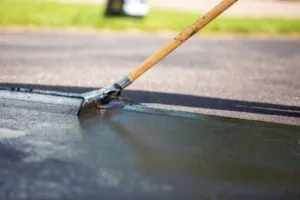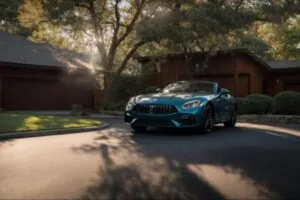Your asphalt driveway is one of the first things people notice about your home. But beyond curb appeal, it also plays a crucial role in protecting your property from damage caused by weather, water, and daily wear. Over time, exposure to UV rays, rain, oil spills, and freezing temperatures can cause cracks and deterioration. That is why choosing the best sealer for asphalt driveway maintenance is essential to extend its lifespan and keep it looking great.
With so many sealers available, from coal tar to acrylic and asphalt-based options, deciding which one is right for your driveway can be overwhelming. Some offer superior protection against harsh weather, while others focus on eco-friendliness or faster drying times. The wrong choice could lead to frequent resealing, cracking, or even expensive repairs.
This guide will explain everything you need to know about selecting the best sealer for asphalt driveway maintenance. We will compare different types, explain their benefits and drawbacks, and help you make an informed decision that keeps your driveway durable and well-protected.
Why Seal Your Asphalt Driveway?
Sealing your asphalt driveway is one of the best ways to protect it from damage and extend its lifespan. Over time, exposure to the elements and daily traffic can wear down the surface, leading to cracks, potholes, and fading. Choosing the best sealer for asphalt driveway maintenance ensures durability, prevents costly repairs, and keeps your driveway looking new. But what is the best driveway sealer, and why is sealing so important? Let’s explore the key reasons you should invest in sealing your asphalt surface.
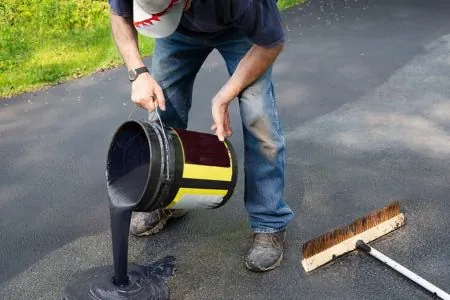
Protection Against Weather and Wear
Your driveway is constantly exposed to sun, rain, snow, and vehicle traffic, all contributing to its deterioration. UV rays can break down the asphalt’s surface, while water can seep into small cracks and cause significant damage when it freezes and expands. The best asphalt driveway sealer is a protective layer that prevents moisture penetration and shields against oxidation.
Without sealing, your driveway will develop cracks, potholes, and uneven surfaces much sooner. Investing in the best asphalt driveway sealer not only saves you money on repairs but also ensures your driveway remains strong and functional for years.
Enhancing Appearance and Longevity
A freshly sealed driveway looks smoother, darker, and well-maintained, instantly boosting your home’s curb appeal. Over time, asphalt fades and loses its rich black color, making it look old and worn. Applying the best sealer for asphalt driveway restores its original appearance while adding a layer of durability.
Sealing also fills in minor surface imperfections, creating a more even and polished look. More importantly, an adequately sealed driveway lasts much longer, preventing cracks and surface damage from spreading. Using the asphalt best driveway sealer every few years ensures you maximize your driveway’s lifespan while keeping it in top condition.
Types of Driveway Sealers for Asphalt
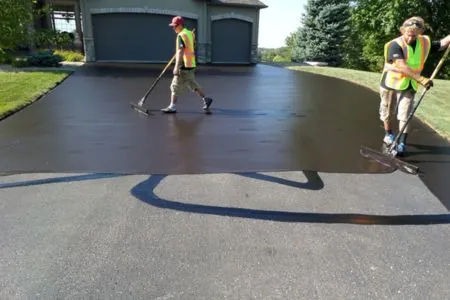
Choosing the right sealer is essential for protecting and maintaining your asphalt driveway. Each sealer type offers different durability levels, weather resistance, and application benefits. Whether you are looking for long-lasting protection, eco-friendly options, or a fast-drying formula, knowing the differences can help you make the best decision. Below, we break down the most common types of driveway sealers so you can determine which one best suits your needs.
Coal Tar Sealer
Coal tar sealer is one of the most durable options, offering excellent protection against oil, gas, and chemical spills. It forms a hard, protective surface that resists cracking and damage from harsh weather conditions. This type of sealer also provides a deep black finish, enhancing the driveway’s look. However, coal tar contains chemicals that can be harmful to the environment and requires protective gear during application due to its strong fumes.
Asphalt Emulsion Sealer
Asphalt emulsion sealer is a popular, eco-friendly alternative to coal tar. Made from asphalt and water-based emulsifying agents, it provides a strong protective layer without the harmful chemicals found in coal tar sealers. It is easy to apply, dries quickly, and has a low odor. While it offers good protection against weather damage, it is not as resistant to oil and gas spills, making it better suited for residential driveways with light vehicle traffic.
Acrylic Sealer
Acrylic sealer is a premium option known for its excellent durability and UV resistance. It is available in multiple finishes, including matte and high-gloss, allowing homeowners to customize the appearance of their driveway. This sealer dries quickly, is resistant to oil and chemical spills, and does not emit strong fumes. However, it is more expensive than other options, making it a better choice for those looking for long-term performance and aesthetic appeal.
Oil-Based Sealer
Oil-based sealers penetrate deep into the asphalt surface, restoring flexibility and preventing cracking. They are handy for older driveways that have become brittle over time. These sealers provide a rich, dark finish and offer decent protection against moisture and wear. On the downside, they take longer to dry than water-based alternatives and may not be as environmentally friendly due to their petroleum-based composition. While effective, oil-based sealers are becoming less popular due to environmental concerns and regulatory restrictions in some areas.
How to Choose the Best Sealer for Your Asphalt Driveway
The best sealer for an asphalt driveway depends on factors like climate, driveway condition, and traffic level. If you need maximum durability and resistance to oil spills, a coal tar sealer is a strong choice, but it comes with environmental concerns. Asphalt emulsion sealer is a great eco-friendly alternative, providing solid protection with fewer chemicals. If appearance and UV resistance matter most, acrylic sealers offer a premium finish and long-lasting performance.
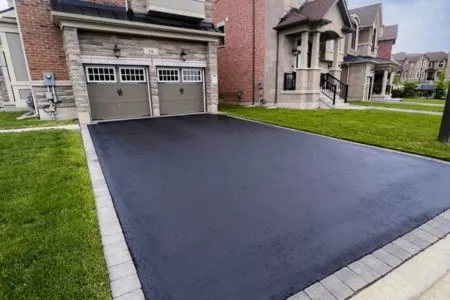
Consider how much wear your driveway experiences and your local weather conditions. Oil-based sealers work well for aging driveways, restoring flexibility, while water-based sealers dry faster and are easier to apply. No matter which option you choose, regular sealing is key to extending your driveway’s lifespan and preventing costly repairs. Investing in the best driveway sealer for asphalt ensures long-term protection and a fresh, well-maintained look.
How to Apply Driveway Sealer Like a Pro
Applying the best sealer for asphalt driveway properly ensures long-lasting protection and a professional-looking finish. Whether you are sealing a driveway for the first time or reapplying for maintenance, the process requires careful preparation, the right materials, and proper application techniques. Skipping steps or using the wrong sealer can lead to premature wear, cracks, and a messy finish. Follow these key steps to achieve a durable and well-protected driveway.
Step 1: Prepare the Surface
The surface must be thoroughly cleaned before applying any of the best driveway sealers for asphalt. Remove dirt, oil stains, and debris using a pressure washer or stiff-bristle broom. Fill in any cracks with asphalt patch filler and allow it to dry completely. If there are deep potholes, they must be repaired before sealing. A clean, smooth surface ensures better adhesion, preventing peeling and uneven coverage once the sealer is applied.
Step 2: Choose the Right Sealer
Selecting the best asphalt driveway sealer depends on your specific needs. For heavy-traffic areas, coal tar or acrylic sealers provide maximum durability. Asphalt emulsion sealers are a great alternative if you prefer an environmentally friendly option. Consider factors such as climate, drying time, and oil resistance. Reading product labels and following manufacturer recommendations will help you choose the best option for long-term protection.
Step 3: Apply and Maintain
Once the surface is prepared and the best sealer for asphalt driveway is selected, apply it evenly using a squeegee or sprayer. Start at one end of the driveway and work in sections to ensure consistent coverage. Allow the sealer to dry completely before driving on it—typically 24 to 48 hours. Regular maintenance, such as resealing every 2-3 years and keeping the surface clean regularly, extends the lifespan of your driveway. For more details on how often to reseal, visit driveway maintenance how often to reseal.
Find the Best Asphalt Driveway Sealer for Your Needs Today!
Sealing your asphalt driveway is one of the best investments you can make to protect it from cracks, weather damage, and everyday wear. Choosing the best sealer for an asphalt driveway depends on factors like durability, climate, and maintenance needs. Whether you opt for coal tar, asphalt emulsion, acrylic, or oil-based sealers, regular sealing ensures your driveway stays strong and looks great for years to come.
Applying the best driveway sealer for asphalt the right way can significantly improve longevity and performance. Proper preparation, selecting the right product, the right contractor and following the correct application process will maximize protection and prevent costly repairs. Maintaining your driveway with routine sealing will keep it in top condition, saving you time and money in the long run.
Need expert sealcoating services? Contact Donovan Sealcoating today! We will help protect and enhance your asphalt driveway with professional expertise and high-quality materials. Call us now to schedule your service and get the best protection for your driveway!
Frequently Asked Questions (FAQs)
1. How often should I seal my asphalt driveway?
For best results, you should seal your asphalt driveway every 2-3 years. However, factors like climate, traffic, and the quality of the previous sealer can affect the frequency. If you notice fading, cracks, or water absorption, it may be time to apply a fresh coat of the best sealer for asphalt driveway to maintain its protection.
2. What is the best driveway sealer for asphalt in harsh weather conditions?
If you live in an area with extreme weather, a coal tar sealer is a strong choice due to its durability and resistance to UV rays, chemicals, and moisture. Acrylic sealers are also a great option for superior UV protection. In regions with frequent freeze-thaw cycles, choosing a high-quality asphalt that’s the best driveway sealer that prevents water penetration is crucial.
3. Can I apply driveway sealer myself, or should I hire a professional?
Yes, you can apply best driveway sealer for asphalt yourself with the right tools and preparation. However, professionals ensure even application, and proper surface preparation, and use high-quality sealers that last longer. If you want a durable and flawless finish without the hassle, hiring an expert like Donovan Sealcoating is a great option.
4. How long does it take for driveway sealer to dry?
Drying times vary based on the type of sealer and weather conditions. Most best sealers for asphalt driveway options require 24-48 hours to cure before driving on the surface. Water-based sealers tend to dry faster, while oil-based options may take longer. Always check the manufacturer’s recommendations for the best results.
5. What happens if I don’t seal my asphalt driveway?
If you skip sealing, your asphalt driveway will be vulnerable to cracks, fading, and moisture damage. Water can seep into small openings, causing expansion during freezing conditions and leading to potholes. Unsealed driveways also wear down faster from UV exposure and vehicle traffic, requiring costly repairs. Using the best driveway sealer for asphalt extends its lifespan and maintains its strength.

